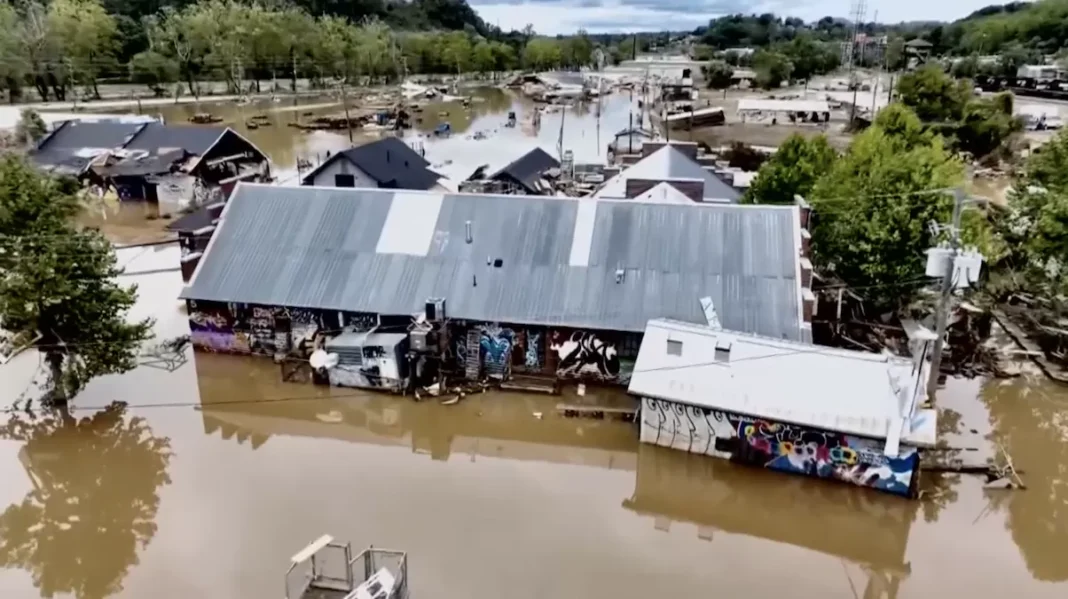Desperate Residents Struggle to Survive After Hurricane Helene Ravages Western North Carolina
The aftermath of Hurricane Helene has left a trail of devastation in western North Carolina. The powerful storm, which tore through the Southeastern U.S., has claimed the lives of at least 116 people in six states. The death toll is expected to rise as rescuers and emergency workers continue to reach isolated areas.
Residents in the affected areas are facing desperate circumstances, with washed-out roads and the lack of power and cellular service leaving them isolated and cut off from the rest of the world. Many are struggling to find basic necessities such as food and water, and are anxiously trying to reach their loved ones to let them know they are alive.
In Buncombe County, which includes the mountain city of Asheville, 30 people have lost their lives and over 1,000 missing persons reports have been received. The governor of North Carolina, Roy Cooper, has warned that the toll is likely to increase as rescue efforts continue.
The city of Asheville has been hit particularly hard, with many main routes washed away or blocked by mudslides. The city’s water system has also been severely damaged, leaving residents with no access to clean water. Some are resorting to scooping creek water into buckets in order to flush their toilets.
The situation is especially dire for residents of the Hillcrest Housing project, who are facing days without basic services. “It’s survival right now,” said resident Samuel Giles. With no power or water, residents are struggling to meet their basic needs.
In the midst of the chaos, there are glimmers of hope and moments of solidarity. In one neighborhood, where a wall of water destroyed everything in its path, people are coming together to support each other. “That’s the blessing so far in this,” said Sommerville Johnston, as she shared food and water with her neighbors.
But for many, the situation remains dire. Derek Farmer, who has been without water for three days, waited in line for over a block at Mountain Valley Water to fill up containers. “I just didn’t know how bad it was going to be,” he said.
The storm has also caused extensive damage to infrastructure, with hundreds of roads closed and widespread flooding. The Federal Emergency Management Agency (FEMA) has reported that over 1,000 people are currently seeking shelter in the affected areas.
Governor Cooper has urged residents to avoid travel for their own safety and to keep roads clear for emergency vehicles. Search teams are working tirelessly to reach stranded individuals, and the community has come together to offer support. In Asheville, a group of volunteers brought their mules to deliver food, water, and other essential supplies to hard-to-reach areas.
For those who have managed to find a cell signal, the priority is to let their loved ones know they are safe. “Is this day three or day four?” asked Colleen Burnet. “It’s all been a blur.” The storm has unleashed the worst flooding in a century in North Carolina, with some areas receiving over 2 feet of rain since Wednesday.
President Joe Biden has promised that the federal government will stand by the survivors and those affected by Hurricane Helene “as long as it takes.” He plans to ask Congress for additional funds for disaster assistance and intends to visit North Carolina later this week.
The storm has also raised concerns about the impact of climate change on extreme weather events. With warmer waters and rapidly intensifying storms, the Southeastern U.S. is at a higher risk of being hit by powerful hurricanes.
The devastation caused by Helene is not limited to North Carolina. In Florida, the Clearwater Marine Aquarium was flooded, forcing workers to move two manatees and sea turtles to safety. In Georgia, Governor Brian Kemp has declared that the storm “literally spared no one,” with most residents in and around Augusta still without power.
South Carolina has also been hit hard, with at least 25 deaths reported. Helene is the deadliest tropical cyclone to hit the state since Hurricane Hugo in 1989, which claimed the lives of 35 people.
As the Southeastern U.S. struggles to recover from the damage caused by Helene, another storm is brewing in the Atlantic. Tropical Storm Kirk has formed and is expected to become a “large and powerful hurricane” in the coming days. The U.S. National Hurricane Center has issued a warning, although the storm is currently not a threat to land


